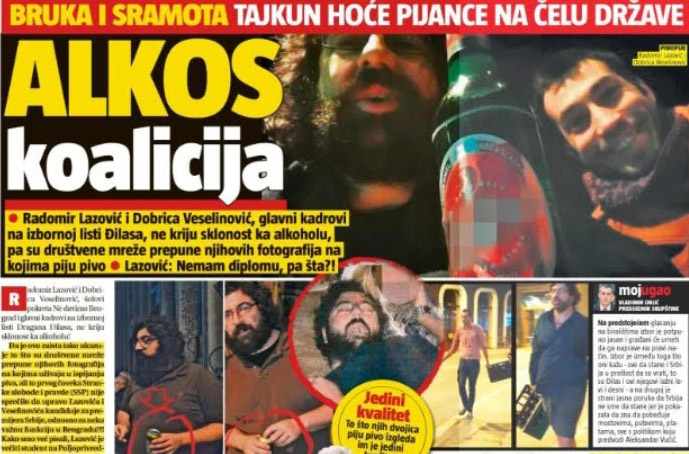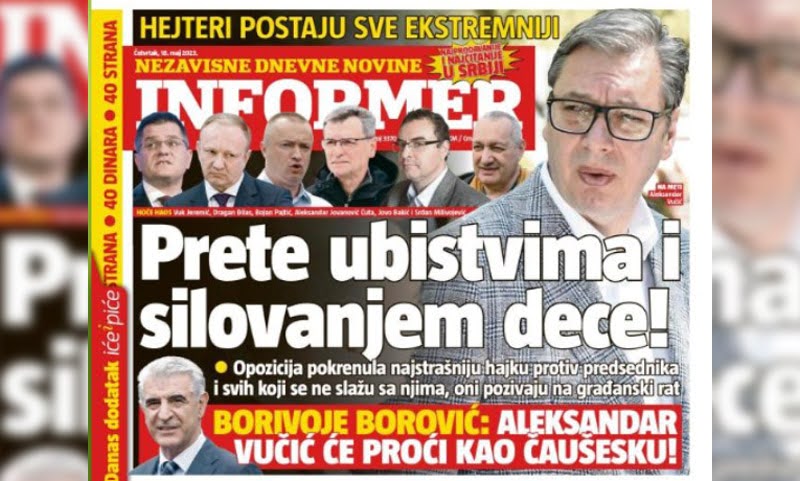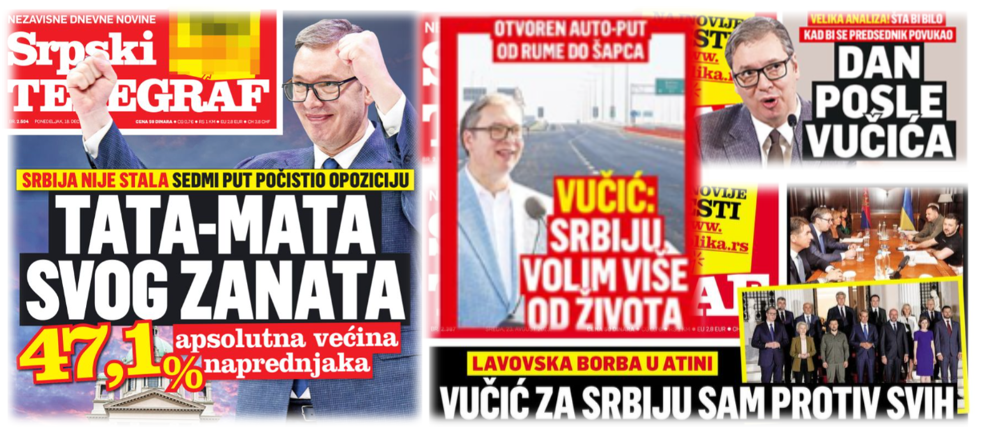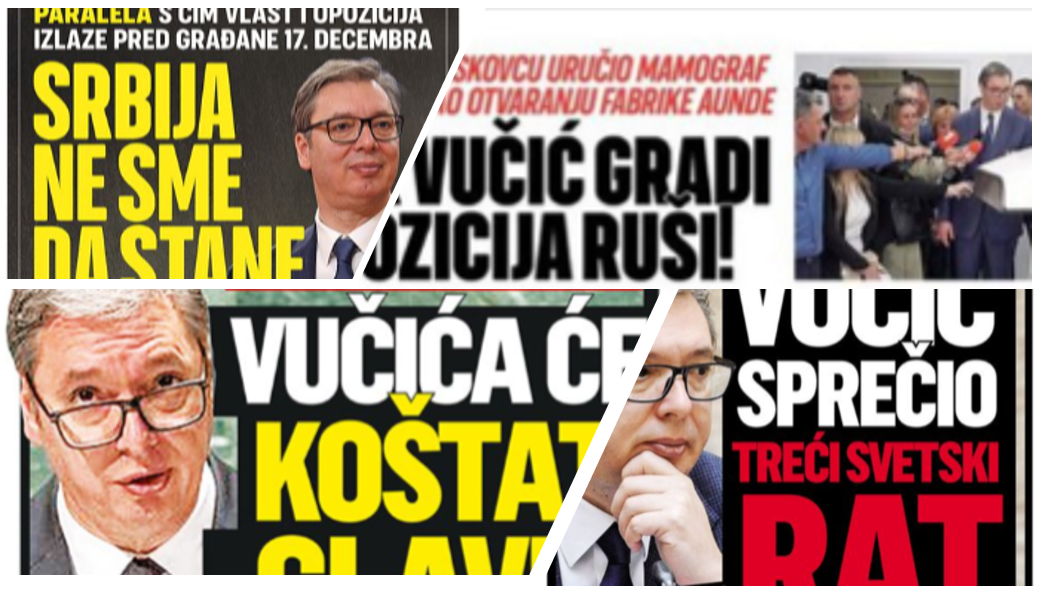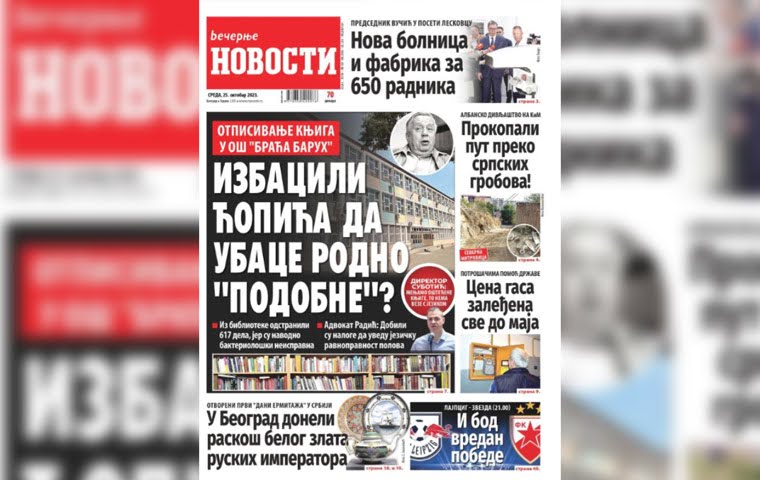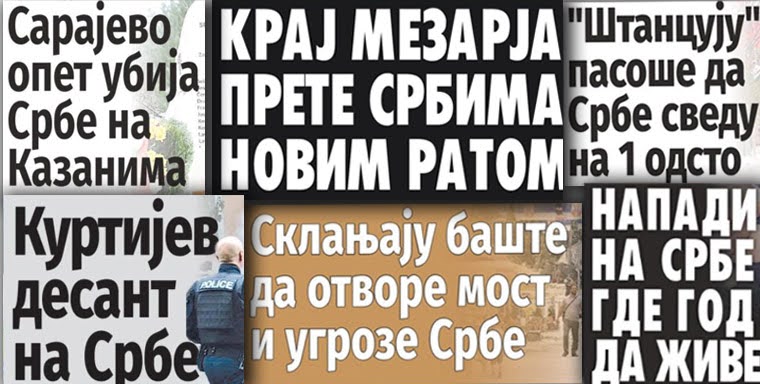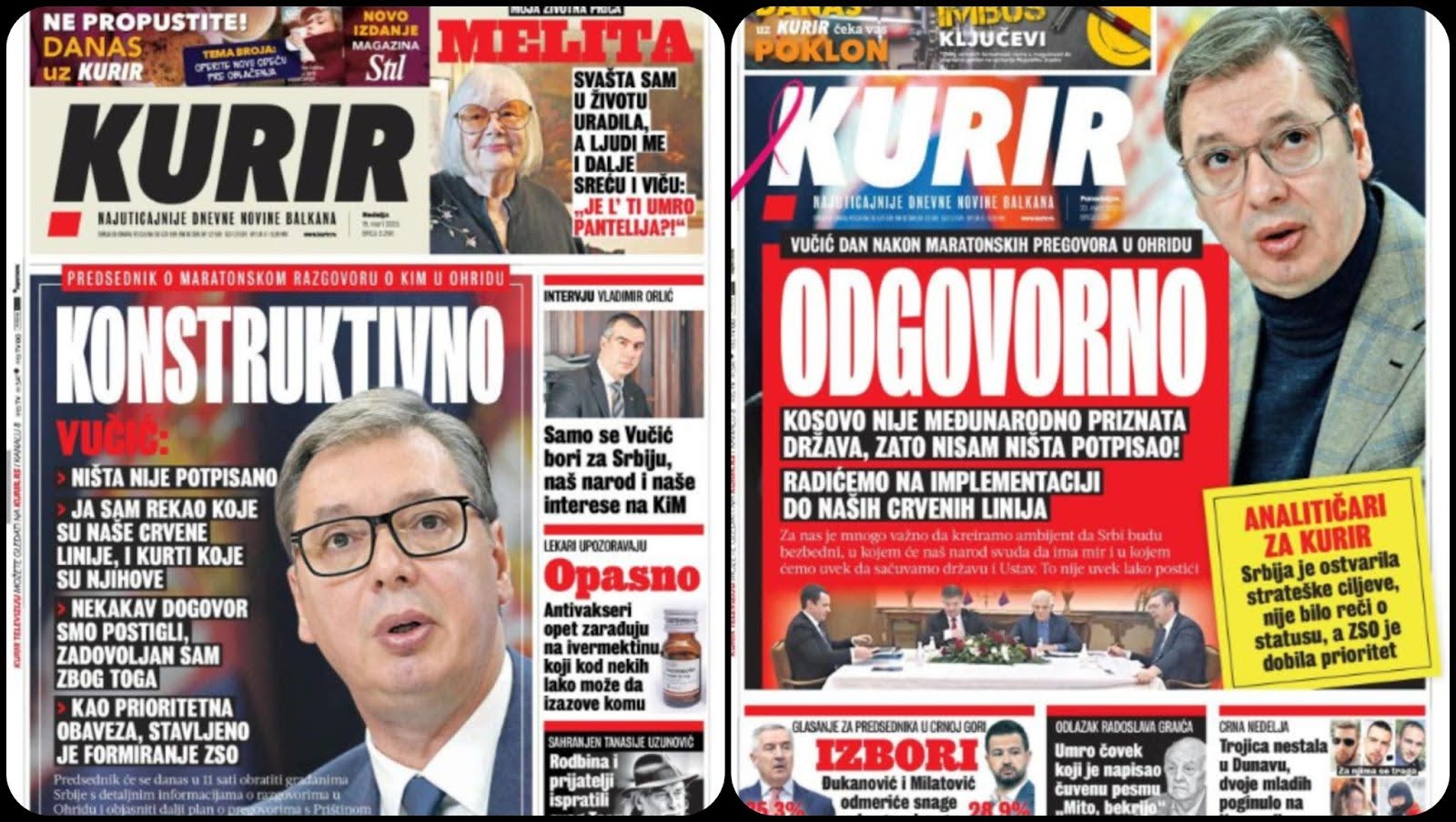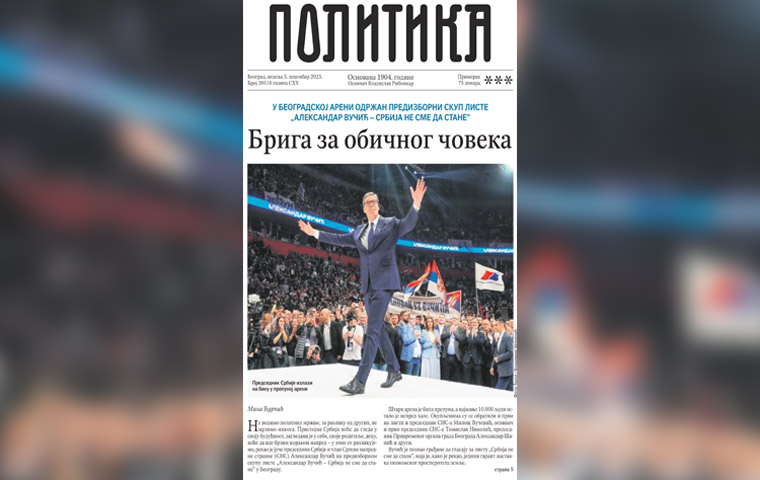Analiza
Serbian Front Pages in 2023: Six Newspapers, Over 1,150 Manipulations
16.04.2024. Marija Vučić, Milica Ljubičić, Vesna Radojević; Translation: SeeCheck.org Photo: Raskrikavanje
Last year, Raskrikavanje recorded at least 1,154 instances of manipulation on the front pages of six daily newspapers: Informer, Srpski Telegraf, Alo, Vecernje Novosti, Kurir, and Politika. These headlines were predominantly unfounded, biased, and manipulative. Due to the rising number of manipulative news pieces encountered in Politika, it has been included in our analysis this year.
Informer led with the highest number of manipulative news, featuring 348 instances across 306 issues, averaging more than one manipulation per day. It was followed by Srpski Telegraf with 252 instances, Alo with 232, Vecernje Novosti with 226, Kurir with 56, and Politika with 40.
This year, Aleksandar Vucic remained the most frequently featured individual, often portrayed in a positive (and occasionally neutral) context, appearing on the front pages nearly every day. Meanwhile, the publishers of these six newspapers have secured deals exceeding 1.3 million euros with the state through tenders and local media competitions.
Informer: Sissies, Lunatics, Inebriates
More than a decade ago, when Radomir Lazovic bought drinks for the opening of an exhibition he organized in Belgrade, he couldn’t have foreseen that this action would one day be used against him.
Since becoming a prominent figure in political life as a leader of the ‘Don’t Let Belgrade D(r)own’ movement and later the Green-Left Front, tabloids have periodically published photos of him and his colleague Dobrica Veselinović carrying crates of beer. Other photos, sourced from private Facebook and Instagram accounts, show him holding a can. Pro-regime tabloids have framed these decade-old images to depict the opposition as led by drunkards and vagrants. This narrative was particularly emphasized by Informer in several front pages in October 2023, right before the parliamentary elections, branding Lazovic as an ‘alcoholic’ again.
Lazovic’s response to these allegations was straightforward: “Yes, sometimes I buy beer. What’s the problem with that? I have nothing to be ashamed of, I live like everyone else,” he expressed to Raskrikavanje.
Regarding the most intense tabloid campaign, he recalls the one from 2022 when Srpski Telegraf linked him to the criminal group led by Veljko Belivuk, and falsely accused his father of being a rapist. Given his experiences, one might assume that recent articles by Informer wouldn’t bother him at all.
However, that’s not the case.
“I didn’t get desensitized and I try not to, because then I might lose my humanity. Anyone who claims such attacks don’t affect them is not being truthful. It bothers everyone, including me,” he clarified.
On the days he appears on the front page, he finds it most difficult when family members and friends bring it up, sending him links and reminders. Even if they only mean to joke about the tabloid insults or dismiss them as nonsense, it ‘opens a wound.’
“They have no bad intentions, and it might even seem funny to them, but not to the people who were attacked. Every repetition of those words reawakens the pain,” says Lazovic.
Manipulative headlines frequently adorn the covers of Informer. As Raskrikavanje established, this tabloid featured 348 instances of manipulation on its 306 front pages in 2023 alone. These weren’t merely insults or unsupported claims, but also blatant propaganda, fact manipulation, and disinformation.
A particularly stark example of Informer’s tactics appeared on the cover dated May 18, 2023. The headline heavily accused opposition representatives, including Aleksandar Jovanovic Cuta, of ‘threatening to kill and rape children.’ Jovanovic Cuta responded by suing the editor-in-chief, Dragan J. Vucicevic. A recording from one of their court hearings was later published online at the end of February this year.
In the video, the judge inquired why such a headline was chosen. Initially, Vucicevic excused himself, claiming he couldn’t remember as the article was from the previous year, and he hadn’t had time to prepare due to, in his words, ‘hundreds of lawsuits.’ He then shifted responsibility, stating that he was not in charge at the time but merely the editor-in-chief.
Vucicevic proceeded to search for the controversial article on Informer’s website and explained that it was based on hateful comments allegedly made by opposition ‘bots’ online. He asserted that the article itself did not claim that Cuta and others were threatening to murder and rape children, despite that being the exact phrasing used on the front page. However, Vucicevic offered another ‘explanation’:
“They lead this policy, which curses children and announces murders and rapes of children. That’s why they are here, that’s why Mr. Jovanovic is here. Nowhere in the text does it state that he said anything. But he still supports that policy to this day.” In response, Jovanovic retorted, “You are not normal.”
It is impossible to discuss the sensational headlines and baseless accusations made by Informer without mentioning Dragan Djilas, a Serbian businessman and politician who is currently a member of the National Assembly of the Republic of Serbia. Last year, he appeared on the front pages 54 times, almost always in a negative light: ‘Djilas Pushing a Thug to Become Prime Minister,’ ‘Djilas’s People Want to Seize Power by Force,’ ‘Djilas Protects a Thief Who Steals from Children,’ ‘Tycoon Djilas Would Cover Up a Drug Affair,’ ‘Djilas Supporters Create Chaos,’ ‘Djilas Supporters Admitted They Were Liars…’
Although the businessman and opposition politician is often portrayed as the primary antagonist in Informer, last year Albin Kurti, Kosovo Prime Minister, took the lead. There were numerous articles about Kurti, particularly in the context of events related to Kosovo, but most headlines were derogatory: ‘Kurti Ripe for a Madhouse,’ ‘Shiptar’s Villain Has Lost His Mind,’ ‘Crazy Kurti Reignites the Fire,’ ‘Scholz and Macron Incite Kurti,’ ‘Kurti Thirsts for More Blood,’ ‘Sissy! Women Had to Save a Terrified Kurti from a Beating.’
Although it may seem otherwise, Informer does occasionally publish praise and positive words, but these are primarily reserved for the country’s president. As our count shows, Vucic appeared on the front page of Informer at least 156 times last year, which is roughly every other day. Each appearance portrayed him in a positive or neutral context — sometimes as a victim, other times as a hero, but always as a fighter and savior.
Srpski Telegraf: Vucic, a Master of His Craft
Srpski Telegraf published at least 252 unfounded, biased, and manipulative news stories on its front pages last year, predominantly focusing on internal politics.
Aleksandar Vucic, the President of Serbia, was a frequent subject, appearing 258 times on the covers of this tabloid, mostly in a positive light. Throughout the year, the publication closely followed the president’s activities, broadcasting his speeches and portraying him as a courageous leader undeterred by the near-daily attacks from various quarters. For instance, early in 2023, Srpski Telegraf wrote about the dire ‘black scenarios’ that could allegedly ensue should Vucic step down, such as endless elections and economic turmoil.
Additionally, when the Serbian Progressive Party (SNS), led by Vucic, organized the ‘Serbia of Hope’ rally in Belgrade following two mass murders and in response to the ‘Against Violence’ protests, Srpski Telegraf described it as ‘the largest rally in our country’s history,’ intended to ‘defend Serbia.’ After the parliamentary elections in December, the tabloid hailed Vucic as ‘the master of his craft,’ claiming he had ‘cleaned the opposition.’
Along with its constant praise of Aleksandar Vucic, Srpski telegraf also targeted those it labeled as ‘enemies’ of Vucic and Serbia, frequently attacking the domestic opposition. In the early months of the year, the tabloid clashed with right-wing opposition members, primarily over their criticism of Vucic’s handling of negotiations between Serbia and Kosovo in Brussels and Ohrid. Srpski Telegraf branded them ‘liars,’ adamantly asserting that Vucic had not signed any agreements.
The pro-European opposition was not spared either, especially during the ‘Against Violence’ protests. They were derogatorily called ‘political vultures’ and ‘thugs.’ The tabloid accused them of ‘bullying the citizens’ with blockades and claimed their real interest was not in combating violence but in jockeying for positions of power.
In September, the opposition disrupted the work of the National Assembly by demanding the calling of extraordinary parliamentary elections, due to unmet demands from the ‘Serbia Against Violence’ protests. Srpski Telegraf manipulatively reported that the opposition’s disruption of the parliamentary session aimed to ‘block salaries, pensions, and aid for the treatment of sick children,’ without providing context for why some deputies were actually hindering the assembly’s work. This negative portrayal of the opposition persisted throughout the election campaign at the year’s end.
Over the past year, Srpski Telegraf frequently used its front page to publish details from the Ribnikar mass murder investigation, often relying on unnamed sources and presenting unverified information about the underage perpetrator K.K. and his family. For instance, the tabloid claimed, citing an anonymous source, that the minor K.K. told police, “I killed them so that my mother would suffer.” This source also purportedly said that K.K. expressed regret that he ‘cannot see his mother suffer.’ Srpski Telegraf frequently included details that lacked public interest, such as K.K. allegedly asking if children called him ‘the king,’ his father changing his appearance, K.K.’s refusal to eat beans in favor of ‘quality food,’ and his requests to go home for the New Year.
Beyond internal politics and crime reporting, Srpski Telegraf also manipulatively covered international events, particularly focusing on relations between USA and Russia, the West and the East, the war in Ukraine, and the conflict in Gaza.
Russian President Vladimir Putin was featured on the front page of Srpski Telegraf 124 times last year. On several occasions, his photo appeared even when the articles were not directly about him but focused on events at the front in Ukraine, the weaponry used by the warring parties, and their potential impact. The tabloid at times took a dramatic tone, with headlines such as ‘Patriot Broke Putin’s Pride’ and ‘Putin Pierced the Air Defense Forces of Ukraine with Locusts.’ Additionally, Srpski Telegraf engaged in speculation about Putin’s health, alleged internal conspiracies in the Kremlin, and his conflicts with Yevgeny Prigozhin, leader of the Wagner Group.
The tabloid also frequently claimed to publish ‘exclusives’ consisting of documents or interviews that supposedly surfaced after many years. However, it often turned out that this content had long been publicly available, undermining the exclusivity of these reports.
Alo Confronts the ‘Enemies of the State’
A thirty-five-year-old postman from Belgrade, Stefan Mitrovic, frequently appeared on the front pages of Serbian tabloids last year. Alo dubbed him ‘Šolak’s postman’, in reference to Dragan Šolak, Serbian businessman and media mogul. The tabloid claimed that Mitrovic could not possibly live on his salary alone, questioning how he could afford a ‘brand new car’ on a postal worker’s income.
Mitrović was targeted by these publications simply because he exercised what is considered a basic worker’s right in the 21st century—a strike.
At the end of last year, Mitrovic and his colleagues halted their work at the Post, demanding higher salaries, an increase in staff numbers, and improved working conditions. As one of the strike’s leaders, Mitrovic frequently represented his colleagues in public negotiations. Consequently, the tabloids attempted to discredit him in various ways, including associating the strike with the opposition and Dragan Solak.
“I assume they received orders from the state, under whose patronage they operate, to throw rocks at me,” said Stefan Mitrovic, who has been a postman for ten years, in an interview with Raskrikavanje. He added that it is one of the lowest-paid jobs at this state-owned company.
Mitrovic expressed his surprise that the tabloids went as far as to label him a tycoon. However, he noted that such portrayals did not significantly affect him.
“A worker’s spark appeared, and a fire of dissatisfaction spread across Serbia. Everyone fought in their own way, using whatever means and knowledge they had.”
Last year, we identified at least 232 unfounded, biased, and manipulative claims on the front pages of Alo, mostly related to internal politics.
The primary figure in these reports was the President of Serbia, Aleksandar Vucic, whose photos appeared on the covers 137 times. Alo consistently supported him in all confrontations with the opposition, reporting that ‘while Vucic builds, the opposition destroys,’ ‘Vucic destroyed the former regime,’ and ‘President Vucic continues the fight alone. The opposition does not care for Kosovo,’ and during his speech at the UN, Alo wrote that Vucic ‘told the powerful off.’
Throughout the past year, Alo’s principal adversary was Kosovo’s Prime Minister Albin Kurti. Alo labeled Kurti a ‘terrorist,’ ‘monster,’ ‘prime minister of a fake state,’ and even compared him to Hitler. The publication consistently portrayed Kurti in a negative light, accusing him of ‘terrorizing Serbs,’ ‘desiring war,’ ‘intending to kill Serbs,’ ‘planning a bloody Easter,’ ‘orchestrating chaos in the North,’ and even wanting to ‘set the Balkans ablaze.’
In addition to targeting Kurti, Alo frequently criticized domestic opposition figures.
For instance, Dragan Djilas was featured negatively on Alo’s front pages at least 28 times, predominantly during the final two and a half months of last year, coinciding with the election campaign.
The opposition was also targeted by this tabloid during the election campaign, in which Alo openly supported the Serbian Progressive Party. For example, Alo drew a ‘comparison’ between the government’s and the opposition’s offerings in the elections, claiming that Serbia will never falter with Aleksandar Vucic at the helm, while ‘the NATO-aligned opposition wishes for Serbia not to exist.’
Vecernje novosti and Satisfied Friends from the Government
Proverbially concerned for the health of the Serbian national being, Vecernje Novosti launched an attack on the ‘Braca Baruh’ Elementary School in Belgrade in October 2023. The newspaper reported that the school was removing hundreds of outdated and bacteriologically compromised books from its library, some of which were decades old, including works by Branko Copic and Ivo Andric.
Principal Aleksandar Subotic explained to Vecernje Novosti that the removal was ordered by the City of Belgrade Library, and that the discarded books would be replaced with newer editions. The city library clarified to journalists that this was part of a legally mandated audit, targeting books that had not been opened for over 40 years, described as ‘dirty, damp, and full of mold.’
Despite these explanations, the story quickly escalated to theories of an ideological, anti-Serb agenda. By the end of October, despite assurances from the director and the city library—and the fact that book selection in schools is determined by the Ministry, not individual schools—Vecernje Novosti speculated on its front page that the removed works would be replaced with books written in ‘gender-sensitive language,’ or, in other words, ‘gender-appropriate.’
The arguments supporting the claims made on the front page were virtually absent from the text.
This case illustrates well the editorial policy of this paper: promoting nationalism and traditionalism at the expense of factual accuracy and logical reasoning. The newspaper prioritizes the preservation of so-called national identity, resists modernity and equality, and perpetually combats perceived enemies of the Serbs, who are portrayed as eternal victims in a world aligned against them.
Last year, the perceived enemies were primarily our regional neighbors. In its typical role as an instigator, Vecernje Novosti frequently targeted Croats and Albanians (with Kurti notably vilified), authorities in Bosnia and Herzegovina, and Western entities.
The headlines are telling: ‘Sarajevo Is Killing Serbs Again,’ ‘Brussels’ Attack on Serbia,’ ‘Attacks on Serbs Wherever They Live,’ ‘Kurti’s Attack on Serbs,’ ‘Kurti’s Dangerous Plan: A Hoop Around Serbs to Destroy Them More Easily,’ ‘They Make Criminals Out of Serbs’…
The problematic aspects of Vecernje Novosti are also evident in its denial of war crimes committed by Serbs (‘The Markala Case: They Killed Their Own Twice So That NATO Would Punish the Serbs’) and in the glorification of convicted war criminals (‘Radovan was the backbone of the fight for Serbia and our people’).
Headlines are often sweeping, and the only justification provided in the texts are the opinions of journalists. This manipulation method is characteristic of Vecernje Novosti, where reporting often blends factography with interpretation. Through this mix, the journalist subtly influences the reader’s value judgments by how the facts are presented.
Anyone can be the target of this newspaper – except for Milorad Dodik, a leader of Bosnian Serbs, and Aleksandar Vucic. The president appeared on the front page at least 174 times, almost always in a positive (sometimes neutral) context. He is depicted either as a victim under attack or as a hero actively contributing positively: working, building, organizing, delivering historic speeches, and even baptizing a child on one occasion.
The newspaper’s favorable relationship with Vucic was also evident in its birthday issue on October 16. Vucic’s congratulatory message for the 70th anniversary of Vecernje Novosti was prominently featured on the front page. He praised the news coverage as ‘quick and accurate,’ the interviews as ‘excellent,’ and commentary as ‘unforgettable.’ He also lauded their ‘serious research work’ and ‘utmost professionalism.’
“I congratulate you on your jubilee and I am confident that you will continue the good tradition of journalism, a reputation that has been meticulously built by generations of journalists and editors over the years,” wrote Vucic.
Patriarch Porfirije also had high praise for this pro-regime media outlet, even invoking Joseph Pulitzer in his enthusiastic remarks. Many other influential allies of the newsroom extended their congratulations: Prime Minister Ana Brnabic, Defense Minister Milos Vucevic, Foreign Affairs Minister Ivica Dacic, and Finance Minister Sinisa Mali. Culture Minister Maja Gojkovic described Vecernje Novosti as a ‘source of true news.’ The right-wing opposition was equally complimentary, with Boško Obradovic and Milica Djurdjevic Stamenkovski also lauding the newspaper’s reporting.
Last year, we identified at least 226 instances of manipulation on the front pages of these newspapers, predominantly biased headlines unsupported by evidence or arguments in the articles.
Kurir: We Love Vucic Loud and ClearThe meetings between Aleksandar Vucic and Albin Kurti in Ohrid last March presented the Kurir tabloid with a real opportunity to display its affection for the President of Serbia.
In the week of the meeting, Aleksandar Vucic appeared on the front page four times consecutively. Two days before the Ohrid meeting, Kurir portrayed Vucic as clear and decisive, with promises to defend Serbian interests on the Macedonian lake.
Over the weekend of March 18 and 19, Kurir practically repeated the same headlines—Vucic dominated the pages with praise for being responsible and constructive in Ohrid. The information on the covers was nearly identical.
These four covers were among the 198 for the year where Vucic was portrayed in an almost exclusively positive light. The tabloid did not once provide space for any constructive criticism of the current President of Serbia.
Unlike Vucic, who was depicted as flawless, Kurir itself was not without faults.
In this tabloid, we identified at least 56 unfounded, manipulative, and biased headlines on the front pages, most of which deal with internal politics. Typically, the government’s actions are glorified, while the opposition is portrayed negatively.
‘The Opposition Demands That the Secret Ballot Be Abolished,’ ‘Djilas and Marinika Pay for Rampage in Front of the Assembly,’ ‘A Noose for Hanging Was Brought into the Hall,’ and ‘Zagreb Banned a Textbook for Serbian Children’ are just some of the manipulative headlines that Kurir used against Vucic’s political opponents.
As the year drew to a close, particularly before the December elections, Kurir’s coverage shifted to more negative reporting on Dragan Djilas, who until then had not been a regular feature on the front pages this year, unlike previous years. Alongside Djilas, Kurir also reported negatively — yet with manipulation and bias — on other election participants. For example, Professor Ratko Ristic was accused of ‘grabbing money from the budget’, alluding to his salary as a full professor at the University of Belgrade.
As is typical before elections, officials from the Socialist Party of Serbia frequently appeared on the covers of this tabloid. It was only during the election campaign that Kurir’s readers could find articles about Dušan Bajatovic, Igor Braunovic, or about the alleged ‘betrayal’ supposedly being orchestrated by SPS leader Ivica Dacic.
Politika: Vucic’s Silent Soldier
Lazar Pavlovic was no stranger to negative media coverage. For years, he has been involved with the Gay Straight Alliance, an organization advocating for LGBT rights.
However, the articles published on May 28 last year took a different tone.
After the tragic events of two massacres in May, Pavlovic and his family attended the ‘Against Violence’ protests. They wore T-shirts emblazoned with ‘Vulture Mom’, ‘Vulture Dad’, and ‘Little Vulture’—a poignant response to President Aleksandar Vucic, who had previously labeled the protest participants as ‘vultures’.
Photos of the Pavlovic family at the protest quickly went viral on social media.
Yet, not everyone was a fan.
Pro-regime media swiftly attacked Pavlovic, branding him a ‘fake gay activist’ and accusing the opposition of exploiting every resource to topple the government.
“For the first time—and I hope the last—my family was also placed in a bad context and on the pillar of shame. It was not something I could ignore,’ Lazar Pavlovic told Raskrikavanje.
One of the most scathing articles about Pavlovic appeared on the web portal 24sedam. After an extensive tirade detailing Pavlovic’s connections and purported ambitions to overthrow the state, the article concluded by highlighting his varied roles: “At one protest, he is a member of the LGBT community; at another, a resister; at a third, a friend of NATO lobbyists who advocate for the independence of the so-called state of Kosovo; and at a fourth, he appears as a family man and father using his child to spread political propaganda.”
This piece was also published by Politika.
Pavlovic says that he was not surprised by this, considering the deep societal divisions in recent years that contributed to the media being less objective.
“Nevertheless, I was somewhat surprised by the amount of resources invested in the attempt to discredit me and my family, the Gay Straight Alliance organization to which I belong, but also other people who were mentioned in the reports of almost all the so-called pro-regime media.”
This year, Politika, the oldest daily newspaper in the Balkans, celebrates its 120th anniversary since its inaugural publication.
Despite its long history, Politika does not enjoy a distinguished reputation. The report on Lazar Pavlovic exemplifies how the newspaper has recently mirrored the reporting trends of other pro-regime media.
In our 2023 analysis, Politika emerged with the fewest manipulative headlines among the newspapers we studied – we recorded 40 of them. We included Politika in this year’s analysis due to a noticeable increase in manipulative content compared to last year.
Almost without exception, the manipulative, biased, and unfounded news published by Politika were related to internal politics. This pattern reflects the overall nature of the newspaper’s reporting: while there are commendable and critical articles about the economy or the judiciary, coverage is seldom critical when it involves President Aleksandar Vucic and his politics.
In this regard, Politika keeps up with other newspapers from our analysis – Vucic appeared on the front pages of these publications 157 times last year, almost invariably cast in a positive light. Headlines like ‘Serbia Is Not a Toy,’ ‘Why Does Serbia Have To Be Blamed For Everything?’ and ‘Caring For the Common Man’ consistently portray Vucic and his actions favorably.
A particularly notable article that caught the attention of Raskrikavanje’s journalists was published by Politika in February last year. Titled ‘Who Is Lying Here’, it addressed, among other things, the case of ‘Daniel Smith’, a fictitious expert interviewed by the newspaper Danas. Politika used this incident to critique the media that had previously criticized it for a similar blunder in 2017—the so-called Dr. Petar Velickovic, who also turned out to be non-existent.
“The Petar Velickovic affair represented a reputational risk for Politika, while today, in deeply politically polarized Serbia, this is not the case with the newspaper Danas,” writes Politika’s journalist Visnja Aranđelovic.
However, just a few days later, on February 20, Politika announced a new series of commentaries by Dževad Galijaševic, an alleged expert on security and terrorism, who has been repeatedly debunked by our Bosnian colleagues at Raskrinkavanje for his false claims.
In the previous year, the media outlets covered in this article collectively secured contracts worth over 1.3 million euros from state and local governments. More details on this can be found here.
